#king vajiralongkorn
Explore tagged Tumblr posts
Text
Just found out the King of Thailand likes to doodle and will put his doodles on cards and royal “gift packs” given out at charity events and oh boy. This is his New Year’s card from 2021, featuring his doodles and pictures of him and his then official concubine (after she was imprisoned and before she mysteriously disappeared):

#king vajiralongkorn#thai royal family#there's nothing wrong with men enjoying cartoons#but a man who exiled his children#kidnapped his daughter#and allegedly broke his sister's ankles when she questioned him bringing his mistress to events and humiliating his wife#doing all these happy family cartoons#is sinister
23 notes
·
View notes
Photo
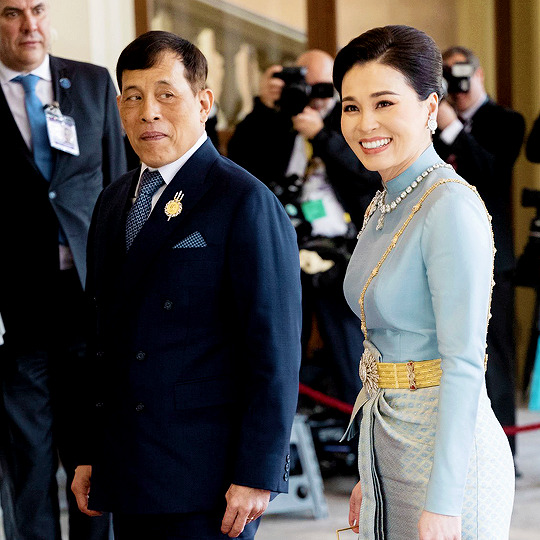
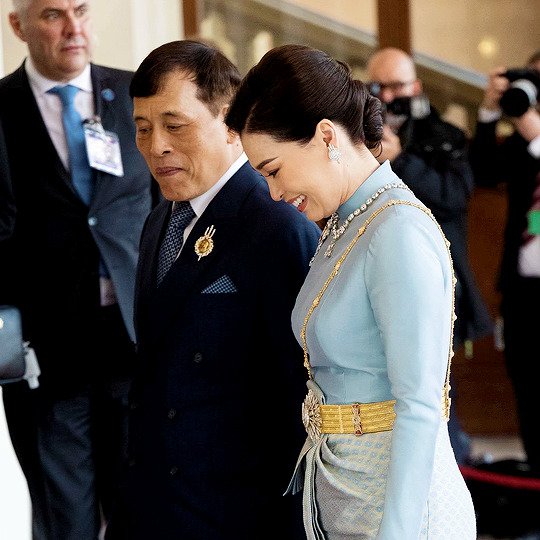
King Vajiralongkorn and Queen Suthida of Thailand attend the Coronation Reception For Overseas Guests at Buckingham Palace | May 05, 2023
#royaltyedit#theroyalsandi#king vajiralongkorn#queen suthida#thai royal family#charles coronation#coronation 2023#my edit#ok hear me out#this is so cute#love suthida
81 notes
·
View notes
Text
Donald Padgett at The Advocate:
The king of Thailand signed a new law recognizing marriage equality, the government announced in its official Royal Gazette on Tuesday, Le Monde with Agence France-Presse reported. With the royal ascent of King Maha Vajiralongkorn, Thailand became Southeast Asia’s first country and only the third country in Asia to recognize marriage equality. The new law will take effect on January 22, 2025. “To all the love,” Prime Minister Paetongtarn Shinawatra posted to X Twitter. “Congratulations on everyone’s love.” The new law amends the country’s civil code and ensures same-sex married couples receive full legal, medical, and financial rights, as well as full inheritance and adoption rights. The new law also amends the civil code to use gender-neutral rather than binary language. The law was passed by the country’s senate on June 18 by a vote of 130 to 4 and was the signature legislation of former Prime Minister Srettha Thavisin, a vocal supporter of the LGBTQ+ community in Thailand.
[...] Thailand joins Nepal and Taiwan as the only countries in Asia recognizing marriage equality when the new law takes effect next year. Taiwan legalized marriage equality in 2019 and Nepal followed in 2023.
With King Maha Vajiralongkorn granting royal assent to the bill legalizing marriage equality in Thailand, they become the first Southeast Asian country to legalize marriage equality.
See Also:
LGBTQ Nation: Thailand becomes first Southeast Asian country to legalize marriage equality
#Thailand#Marriage Equality#LGBTQ+#World News#Southeast Asia#Paetongtarn Shinawatra#King Maha Vajiralongkorn
8 notes
·
View notes
Text

“I think Rama X of Thailand might just be the craziest Modern day monarch.” - Submitted by Anonymous
18 notes
·
View notes
Text
বছরে পেট্রোল খরচই কয়েকশো কোটি টাকা! থাইল্যান্ডের রাজার রাজকীয়তা ও সম্পত্তির গল্প
King Maha Vajiralongkorn: এখানেই শেষ নয়, তালিকা আরও লম্বা! রয়েছে ৩৮টি বিমানও। আর সবথেকে আকর্ষণীয় অনন্য হল ৫২টি নৌকা। যা সম্পূর্ণ রূপে সোনা দিয়ে তৈরি। আর এই সব যানবাহনের বার্ষিক জ্বালানির খরচ প্রায় ৫২৪ কোটি টাকা। Source link
View On WordPress
#Car Collection#Property#Thailand King#Thailand’s King Maha Vajiralongkorn#তাইল্যান্ডের রাজা#��াইল্যান্ডের রাজা#মহা ভাজিরালংকর্ন Net Worth
0 notes
Text
Every internet fight is a speech fight

THIS WEEKEND (November 8-10), I'll be in TUCSON, AZ: I'm the GUEST OF HONOR at the TUSCON SCIENCE FICTION CONVENTION.

My latest Locus Magazine column is "Hard (Sovereignty) Cases Make Bad (Internet) Law," an attempt to cut through the knots we tie ourselves in when speech and national sovereignty collide online:
https://locusmag.com/2024/11/cory-doctorow-hard-sovereignty-cases-make-bad-internet-law/
This happens all the time. Indeed, the precipitating incident for my writing this column was someone commenting on the short-lived Brazilian court order blocking Twitter, opining that this was purely a matter of national sovereignty, with no speech dimension.
This is just profoundly wrong. Of course any rules about blocking a communications medium will have a free-speech dimension – how could it not? And of course any dispute relating to globe-spanning medium will have a national sovereignty dimension.
How could it not?
So if every internet fight is a speech fight and a sovereignty fight, which side should we root for? Here's my proposal: we should root for human rights.
In 2013, Edward Snowden revealed that the US government was illegally wiretapping the whole world. They were able to do this because the world is dominated by US-based tech giants and they shipped all their data stateside for processing. These tech giants secretly colluded with the NSA to help them effect this illegal surveillance (the "Prism" program) – and then the NSA stabbed them in the back by running another program ("Upstream") where they spied on the tech giants without their knowledge.
After the Snowden revelations, countries around the world enacted "data localization" rules that required any company doing business within their borders to keep their residents' data on domestic servers. Obviously, this has a human rights dimension: keeping your people's data out of the hands of US spy agencies is an important way to defend their privacy rights. which are crucial to their speech rights (you can't speak freely if you're being spied on).
So when the EU, a largely democratic bloc, enacted data localization rules, they were harnessing national soveriegnty in service to human rights.
But the EU isn't the only place that enacted data-localization rules. Russia did the same thing. Once again, there's a strong national sovereignty case for doing this. Even in the 2010s, the US and Russia were hostile toward one another, and that hostility has only ramped up since. Russia didn't want its data stored on NSA-accessible servers for the same reason the USA wouldn't want all its' people's data stored in GRU-accessible servers.
But Russia has a significantly poorer human rights record than either the EU or the USA (note that none of these are paragons of respect for human rights). Russia's data-localization policy was motivated by a combination of legitimate national sovereignty concerns and the illegitimate desire to conduct domestic surveillance in order to identify and harass, jail, torture and murder dissidents.
When you put it this way, it's obvious that national sovereignty is important, but not as important as human rights, and when they come into conflict, we should side with human rights over sovereignty.
Some more examples: Thailand's lesse majeste rules prohibit criticism of their corrupt monarchy. Foreigners who help Thai people circumvent blocks on reportage of royal corruption are violating Thailand's national sovereignty, but they're upholding human rights:
https://www.vox.com/2020/1/24/21075149/king-thailand-maha-vajiralongkorn-facebook-video-tattoos
Saudi law prohibits criticism of the royal family; when foreigners help Saudi women's rights activists evade these prohibitions, we violate Saudi sovereignty, but uphold human rights:
https://www.bbc.com/news/world-middle-east-55467414
In other words, "sovereignty, yes; but human rights even moreso."
Which brings me back to the precipitating incidents for the Locus column: the arrest of billionaire Telegram owner Pavel Durov in France, and the blocking of billionaire Elon Musk's Twitter in Brazil.
How do we make sense of these? Let's start with Durov. We still don't know exactly why the French government arrested him (legal systems descended from the Napoleonic Code are weird). But the arrest was at least partially motivated by a demand that Telegram conform with a French law requiring businesses to have a domestic agent to receive and act on takedown demands.
Not every takedown demand is good. When a lawyer for the Sackler family demanded that I take down criticism of his mass-murdering clients, that was illegitimate. But there is such a thing as a legitimate takedown: leaked financial information, child sex abuse material, nonconsensual pornography, true threats, etc, are all legitimate targets for takedown orders. Of course, it's not that simple. Even if we broadly agree that this stuff shouldn't be online, we don't necessarily agree whether something fits into one of these categories.
This is true even in categories with the brightest lines, like child sex abuse material:
https://www.theguardian.com/technology/2016/sep/09/facebook-reinstates-napalm-girl-photo
And the other categories are far blurrier, like doxing:
https://www.kenklippenstein.com/p/trump-camp-worked-with-musks-x-to
But just because not every takedown is a just one, it doesn't follow that every takedown is unjust. The idea that companies should have domestic agents in the countries where they operate isn't necessarily oppressive. If people who sell hamburgers from a street-corner have to register a designated contact with a regulator, why not someone who operates a telecoms network with 900m global users?
Of course, requirements to have a domestic contact can also be used as a prelude to human rights abuses. Countries that insist on a domestic rep are also implicitly demanding that the company place one of its employees or agents within reach of its police-force.
Just as data localization can be a way to improve human rights (by keeping data out of the hands of another country's lawless spy agencies) or to erode them (by keeping data within reach of your own country's lawless spy agencies), so can a requirement for a local agent be a way to preserve the rule of law (by establishing a conduit for legitimate takedowns) or a way to subvert it (by giving the government hostages they can use as leverage against companies who stick up for their users' rights).
In the case of Durov and Telegram, these issues are especially muddy. Telegram bills itself as an encrypted messaging app, but that's only sort of true. Telegram does not encrypt its group-chats, and even the encryption in its person-to-person messaging facility is hard to use and of dubious quality.
This is relevant because France – among many other governments – has waged a decades-long war against encrypted messaging, which is a wholly illegitimate goal. There is no way to make an encrypted messaging tool that works against bad guys (identity thieves, stalkers, corporate and foreign spies) but not against good guys (cops with legitimate warrants). Any effort to weaken end-to-end encrypted messaging creates broad, significant danger for every user of the affected service, all over the world. What's more, bans on end-to-end encrypted messaging tools can't stand on their own – they also have to include blocks of much of the useful internet, mandatory spyware on computers and mobile devices, and even more app-store-like control over which software you can install:
https://pluralistic.net/2023/03/05/theyre-still-trying-to-ban-cryptography/
So when the French state seizes Durov's person and demands that he establish the (pretty reasonable) minimum national presence needed to coordinate takedown requests, it can seem like this is a case where national sovereignty and human rights are broadly in accord.
But when you consider that Durov operates a (nominally) encrypted messaging tool that bears some resemblance to the kinds of messaging tools the French state has been trying to sabotage for decades, and continues to rail against, the human rights picture gets rather dim.
That is only slightly mitigated by the fact that Telegram's encryption is suspect, difficult to use, and not applied to the vast majority of the communications it serves. So where do we net out on this? In the Locus column, I sum things up this way:
Telegram should have a mechanism to comply with lawful takedown orders; and
those orders should respect human rights and the rule of law; and
Telegram should not backdoor its encryption, even if
the sovereign French state orders it to do so.
Sovereignty, sure, but human rights even moreso.
What about Musk? As with Durov in France, the Brazilian government demanded that Musk appoint a Brazilian representative to handle official takedown requests. Despite a recent bout of democratic backsliding under the previous regime, Brazil's current government is broadly favorable to human rights. There's no indication that Brazil would use an in-country representative as a hostage, and there's nothing intrinsically wrong with requiring foreign firms doing business in your country to have domestic representatives.
Musk's response was typical: a lawless, arrogant attack on the judge who issued the blocking order, including thinly veiled incitements to violence.
The Brazilian state's response was multi-pronged. There was a national blocking order, and a threat to penalize Brazilians who used VPNs to circumvent the block. Both measures have obvious human rights implications. For one thing, the vast majority of Brazilians who use Twitter are engaged in the legitimate exercise of speech, and they were collateral damage in the dispute between Musk and Brazil.
More serious is the prohibition on VPNs, which represents a broad attack on privacy-enhancing technology with implications far beyond the Twitter matter. Worse still, a VPN ban can only be enforced with extremely invasive network surveillance and blocking orders to app stores and ISPs to restrict access to VPN tools. This is wholly disproportionate and illegitimate.
But that wasn't the only tactic the Brazilian state used. Brazilian corporate law is markedly different from US law, with fewer protections for limited liability for business owners. The Brazilian state claimed the right to fine Musk's other companies for Twitter's failure to comply with orders to nominate a domestic representative. Faced with fines against Spacex and Tesla, Musk caved.
In other words, Brazil had a legitimate national sovereignty interest in ordering Twitter to nominate a domestic agent, and they used a mix of somewhat illegitimate tactics (blocking orders), extremely illegitimate tactics (threats against VPN users) and totally legitimate tactics (fining Musk's other companies) to achieve these goals.
As I put it in the column:
Twitter should have a mechanism to comply with lawful takedown orders; and
those orders should respect human rights and the rule of law; and
banning Twitter is bad for the free speech rights of Twitter users in Brazil; and
banning VPNs is bad for all Brazilian internet users; and
it’s hard to see how a Twitter ban will be effective without bans on VPNs.
There's no such thing as an internet policy fight that isn't about national sovereignty and speech, and when the two collide, we should side with human rights over sovereignty. Sovereignty isn't a good unto itself – it's only a good to the extent that is used to promote human rights.
In other words: "Sovereignty, sure, but human rights even moreso."

If you'd like an essay-formatted version of this post to read or share, here's a link to it on pluralistic.net, my surveillance-free, ad-free, tracker-free blog:
https://pluralistic.net/2024/11/06/brazilian-blowout/#sovereignty-sure-but-human-rights-even-moreso

Image: © Tomas Castelazo, www.tomascastelazo.com (modified) https://commons.wikimedia.org/wiki/File:Border_Wall_at_Tijuana_and_San_Diego_Border.jpg
CC BY-SA 4.0 https://creativecommons.org/licenses/by-sa/4.0/
#speech#free speech#free expression#crypto wars#national sovereignty#elon musk#twitter#blocking orders#pavel durov#telegram#lawful interception#snowden#data localization#russia#brazil#france#cybercrime treaty#bernstein#eff#malcolm turnbull#chat control
119 notes
·
View notes
Text
i learned about the most prohibited photos
The distribution of these images is prohibited in Thailand, and anyone who shares this image within the country may face up to 10 years in prison. The individual in the photograph, though he appears to be an inebriated commoner, is in fact His Majesty King Maha Vajiralongkorn, who is entering his limousine. This king is well-known for his vices, including alcohol and gambling, and he does not even reside in Thailand; rather, he rules the country from Germany. However, the public is presented with an image of a king who never leaves the country and is always impeccably dressed.
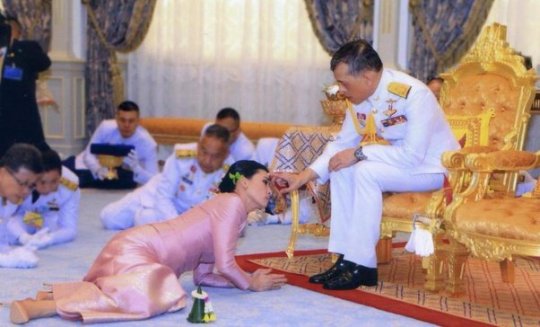
This is one of the most censored images for a good reason: if the public saw their king acting like this, there would be an uproar.
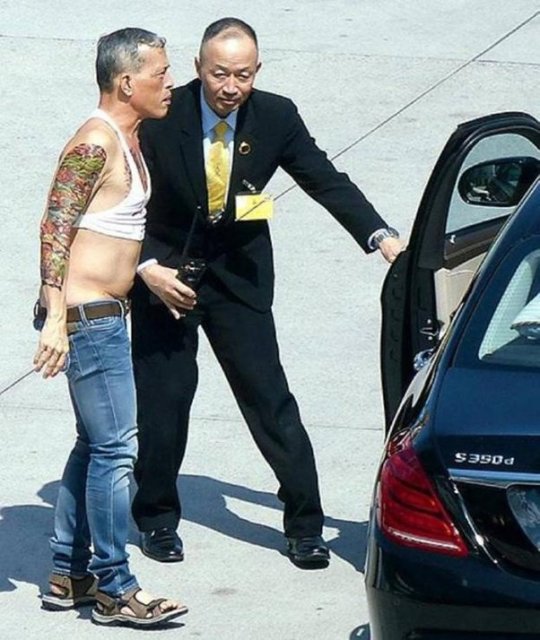
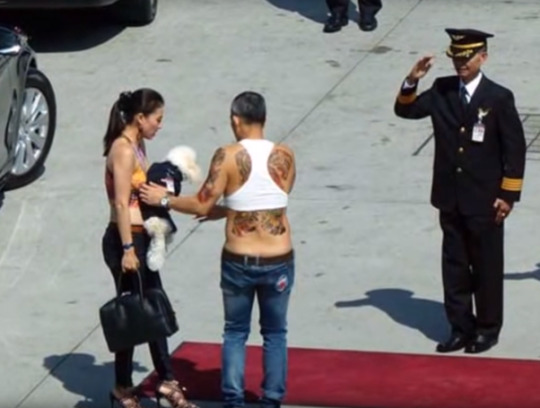
451 notes
·
View notes
Text
Thailand just became the 1st country in Southeast Asia & the 3rd Asian country to legalize same-sex unions after their king signed a marriage equality law.
The other two countries in Asia with marriage equality are Taiwan & Nepal.
Congratulations!
25 notes
·
View notes
Text
Thailand passes landmark bill to legalise same-sex marriage | LGBTQ News | Al Jazeera
The legislation will now go to King Maha Vajiralongkorn for assent, a formality that is widely expected to be granted. It will come into force 120 days after it is published in the royal gazette.

#thailand#lesbian#gay#asia#lgbt#lgbtq#wlw#girls who like girls#bi#lgbtqia#sapphic#same sex marriage#politics
35 notes
·
View notes
Text
CONFIRMED ATTENDEES TO THE CORONATION OF
♚♛ KING CHARLES III & QUEEN CAMILLA ♛♚
───────────── ⋆⋅☆⋅⋆ ─────────────
♔ ┆ Foreign Royalty
King Felipe & Queen Letizia 🇪🇸
King Philippe & Queen Mathilde and Princess Elisabeth, The Duchess of Brabant 🇧🇪
King Jigme Khesar & Queen Jetsun Pema 🇧🇹
Yang di-Pertuan Agong Abdullah & Raja Permaisuri Agong Tunku 🇲🇾
Kīngi Tūheitia & Makau Ariki Te Atawhai of the Māori
Grand Duke Henri & Grand Duchess Maria Teresa 🇱🇺
King Carl Gustaf and Crown Princess Victoria 🇸🇪
King Willem-Alexander & Queen Maxima, Princess Beatrix and Crown Princess Catharina-Amalia, The Princess of Orange 🇳🇱
Crown Prince Haakon & Crown Princess Mette-Marit 🇳🇴
Crown Prince Fumihito & Crown Princess Kiko 🇯🇵
Crown Prince Frederick & Crown Princess Mary 🇩🇰
Prince Albert & Princess Charlene 🇲🇨
King Vajiralongkorn & Queen Suthida 🇹🇭
King Abdullah II & Queen Rania 🇯🇴
King Tupou & Queen Nanasipau’u 🇹🇴
Hereditary Prince Alois & Hereditary Princess Sophie 🇱🇮
King Mswati III & Queen Sibonelo LaMbikiza 🇸🇿
Crown Prince Sheikh Mishal Al Ahmad Al-Jaber Al-Sabah 🇰🇼
Crown Prince Theyazin bin Haitham Al Said 🇴🇲
Emir Tamim bin Hamad Al Thani 🇶🇦
Princess Lalla Meryem 🇲🇦
Prince Turki bin Mohammed bin Fahd Minister of State 🇸🇦
Sheikh Mansour bin Zayed 🇦🇪
King Letsie III & Queen Masenate 🇱🇸
Sultan Hassanal Bolkiah 🇧🇳
King Hamad bin Isa Al Khalifa 🇧🇭
Asantehene Otumfuo Osei Tutu II & Lady Julia of the Ashanti
♔ ┆ Deposed Royalty & Distant Family Relations
Queen Anne-Marie, Crown Prince Pavlos & Crown Princess Mary Chantal 🇬🇷
Margrave Bernhard & Margravine Stephanie of Baden
Landgrave Donatus of Hesse
Prince Philipp & Princess Saskia of Hohenlohe - Langenburg
Margareta (Custodian of the Crown) and Prince Radu 🇷🇴
Crown Prince Alexander & Crown Princess Katherine 🇷🇸
Tsar Simeon & Tsaritsa Margarita 🇧🇬
Annoying Ginger from Montecito
♔ ┆ Governor-Generals of Commonwealth Realms
Governor-General David Hurley & Linda Hurley 🇦🇺
Governor-General Sir Rodney Williams & Lady Williams 🇦🇬
Governor-General Sir Cornelius A. Smith & Lady Smith 🇧🇸
Governor-General Dame Cindy Kiro & Richard Davies 🇳🇿
Governor-General Mary Simon & Whit Fraser 🇨🇦
Governor-General Sir Patrick Allen & Lady Allen 🇯🇲
Governor-General Dame Froyla Tzalam 🇧🇿
Governor-General Dame Cécile La Grenade 🇬🇩
King's Representative Sir Tom Marsters & Lady Tuaine Marsters 🇨🇰
Governor-General Sir David Vunagi & Lady Vunagi 🇸🇧
Governor-General Sir Bob Dadae 🇵🇬
Governor-General Dame Marcella Liburd 🇰🇳
Deputy Governor-General Hyleta Liburd of Nevis
Acting Governor-General Errol Charles 🇱🇨
Governor-General Dame Susan Dougan 🇻🇨
Governor-General Sir Tofiga Vaevalu Falani 🇹🇻
♔ ┆ Heads of Governments of Commonwealth Realms
Prime Minister Anthony Albanese & Jodie Haydon 🇦🇺
Prime Minister Justin Trudeau & Sophie Grégoire Trudeau 🇨🇦
Prime Minister Philip Davis 🇧🇸
Prime Minister Dickon Mitchell 🇬🇩
Prime Minister Chris Hipkins 🇳🇿
Prime Minister Terrance Drew 🇰🇳
Prime Minister Ralph Gonsalves 🇻🇨
♔ ┆ Governmental Representatives of Commonwealth Realms
Margaret Beazley, Governor of New South Wales 🇦🇺
Linda Dessau, Governor of Victoria 🇦🇺
Jeannette Young, Governor of Queensland 🇦🇺
Chris Dawson, Governor of Western Australia 🇦🇺
Frances Adamson, Governor of South Australia 🇦🇺
Barbara Baker, Governor of Tasmania 🇦🇺
Former Prime Minister Hubert Ingraham 🇧🇸
Former Prime Minister Perry Christie 🇧🇸
Michael Pintard, Leader of the Opposition 🇧🇸
Janice Charette, Clerk to the Privy Council of Canada and Secretary to the Cabinet 🇨🇦
High Commissioner Kisha Abba Grant 🇬🇩
High Commissioner Phil Goff 🇳🇿
Christopher Luxon, Leader of the Opposition 🇳🇿
Koni Iguan, Deputy Speaker of the National Parliament 🇵🇬
Justin Tkatchenko, Minister for Foreign Affairs 🇵🇬
Rainbo Paita, Minister for Finance and National Planning 🇵🇬
Taies Sansan, Secretary for the Department of Personnel Management 🇵🇬
Gisuwat Siniwin, former Member of the National Parliament 🇵🇬
Premier Mark Brantley of Nevis
High Commissioner Moses Kouni Mose 🇸🇧
Jeremiah Manele, Minister of Foreign Affairs and External Trade 🇸🇧
♔ ┆ Foreign Heads of States + Governments
President Andrzej Duda & First Lady Agata Kornhauser-Duda 🇵🇱
President Petr Pavel and First Lady Eva Pavlová 🇨🇿
President Ferdinand Marcos Jr. and First Lady Louise Araneta-Marcos 🇵🇭
President Katalin Novák & First Gentleman István Attila Veres 🇭🇺
President Guðni Th. Jóhannesson and First Lady Eliza Reid 🇮🇸
President Michael D. Higgins & First Lady Sabina Higgins and Leo Varadkar, Taoiseach 🇮🇪
President Herzog & First Lady Michal Herzog 🇮🇱
President Egils Levits & First Lady Andra Levite 🇱🇻
President Ali Bongo Ondimba & First Lady Sylvia Bongo Ondimba 🇬🇦
President Mario Abdo Benítez & First Lady Silvana López Moreira 🇵🇾
O le Ao o le Malo Tuimalealiʻifano Vaʻaletoʻa Sualauvi II & Masiofo Faʻamausili Leinafo 🇼🇸
President Paul Kagame & First Lady Jeannette Kagame 🇷🇼
President Wavel Ramkalawan, & First Lady Linda Ramkalawan 🇸🇨
President George Vella & First Lady Miriam Vella 🇲🇹
President Julius Maada Bio & First Lady Fatima Bio 🇸🇱
Hakainde Hichilema & First Lady Mutinta Hichilema 🇿🇲
President Sergio Mattarella 🇮🇹
President Ranil Wickremesinghe 🇱🇰
President Halimah Yacob 🇸🇬
President Faure Gnassingbé 🇹🇬
President Muhammadu Buhari 🇳🇬
President Filipe Nyusi 🇲🇿
President Frank-Walter Steinmeier 🇩🇪
President Vahagn Khachaturyan 🇦🇱
President Alar Karis 🇪🇪
President Sauli Niinistö 🇫🇮
President Emmanuel Macron 🇫🇷
President Luiz Inácio Lula da Silva 🇧🇷
President Alexander Van der Bellen 🇦🇹
President Vahagn Khachaturyan 🇦🇲
President Salome Zourabichvili 🇬🇪
President Katerina Sakellaropoulou 🇬🇷
President Abdul Latif Rashid 🇮🇶
President Vjosa Osmani 🇽🇰
President George Weah 🇱🇷
President Gitanas Nausėda 🇱🇹
President Mohamed Ould Ghazouani 🇲🇷
President Maia Sandu 🇲🇩
President Stevo Pendarovski 🇲🇰
President Lazarus McCarthy Chakwera 🇲🇼
President Ibrahim Mohamed Solih 🇲🇻
President William Ruto 🇰🇪
President Irfaan Ali 🇬🇾
President Wiliame Katonivere 🇫🇯
President Paul Biya 🇨🇲
President Nikos Christodoulides 🇨🇾
President Mohamed Bazoum 🇳🇪
President Marcelo Rebelo de Sousa 🇵🇹
President Klaus Iohannis 🇷🇴
President Macky Sall 🇸🇳
President Zuzana Čaputová 🇸🇰
President Nataša Pirc Musar 🇸🇮
President Võ Văn Thưởng 🇻🇳
Emmerson Mnangagwa 🇿🇼
Chairwoman of the Council of Ministers Borjana Krišto 🇧🇦
Prime Minister Sheikh Hasina 🇧🇩
Prime Minister Han Duck-soo 🇰🇷
Prime Minister Shehbaz Sharif 🇵🇰
President Alain Berset of the Swiss Confederation & Muriel Zeender 🇨🇭
Prime Minister Galab Donev 🇧🇬
♔ ┆ Governmental Representatives
First Lady Jill Biden & Finnegan Biden and John Kerry, Special Presidential Envoy for Climate 🇺🇸
First Lady Olena Zelenska 🇺🇦
First Lady Verónica Alcocer 🇨🇴
Vice President Jagdeep Dhankar 🇮🇳
Vice President Fuat Oktay 🇹🇷
Vice President Tiémoko Meyliet Koné 🇨🇮
Vice President Han Zeng 🇨🇳
Vice President Mohammed B.S Jallow 🇬🇲
Sahiba Gafarova, Speaker of the National Assembly 🇦🇿
Christophe Mboso N'Kodia Pwanga, President of the National Assembly 🇨🇩
Arnoldo André, Minister of Foreign Affairs 🇨🇷
Naledi Pandor, Minister of International Relations and Cooperation 🇿🇦
Nabil Ammar, Minister of Foreign Affairs 🇹🇳
Narayan Prakash Saud, Minister of Foreign Affairs 🇳🇵
Gustavo Manrique, Foreign Minister 🇪🇨
Ahmed Attaf, Foreign Minister 🇩🇿
Frederick Shava, Foreign Minister & Mthuli Ncube, Finance Minister 🇿🇼
Cardinal Pietro Parolin, Cardinal Secretary of State 🇻🇦
Ambassador José Alberto Briz Gutiérrez 🇬🇹
♔ ┆ Representatives from International Organizations
Amina Jane Mohammed, Deputy Secretary General 🇺🇳
Ursula von der Leyen, President of EU Commission 🇪🇺
Charles Michel, EU Council President 🇪🇺
Roberta Metsola, President of the European Parliament 🇪🇺
#coronation 2023 guest list#coronation 23#coronation guests#coronation guest list#british royals#british royalty#king charles#king charles iii#charles iii#queen camilla#queen consort camilla
238 notes
·
View notes
Text
13 notes
·
View notes
Text
ROYAL NEWS!!!
King Vajiralongkorn and Queen Suthida of Thailand are confirmed to attend King Charles’s Coronation next month.

#royaltyedit#theroyalsandi#king rama x#king vajiralongkorn#queen suthida#charles coronation#coronation 2023#my edit#I think this is the first overseas engagement for queen suthida#if the coronation dress code would be with tiara#this will be the first time that we will see suthida wear a tiara#I can't wait
48 notes
·
View notes
Text
Rukchanok "Ice" Srinork, 28, had pleaded not guilty to posting tweets critical of the monarchy.
Ice's Move Forward party, which won this year's election, had urged reform of the lese-majeste laws.
But the unelected senate used this as the main reason for blocking the party's attempt to form a government.
Opposition to the lese-majeste laws was one of the issues which sparked mass protests in 2020, lasting several months. According to Thai Lawyers for Human Rights, around 260 charges have been filed under the lese-majeste law since 2020. Some 2,000 people have been prosecuted under a variety of laws for their involvement in the protests.
On Wednesday, Ice was found guilty of insulting the monarch by a Bangkok court for two posts made before she joined Move Forward - in the first, she criticised the country's handling of the pandemic, and the second was a repost of a tweet that was said to be critical of the monarchy.
Ice will lose her seat if she eventually goes to jail.
Several other leading figures in the Move Forward party are also facing lese-majeste charges - many of whom were activists who took part in the 2020 protests. Those protests were ignited by a controversial court decision in February 2020 which dissolved Future Forward, the previous incarnation of Move Forward and the first party to campaign on a programme of sweeping reform of Thailand's institutions.
Future Forward had done unexpectedly well in the 2019 election, mainly on the back of enthusiastic support from younger voters. This year, Move Forward stunned Thailand's establishment by doing even better, winning more seats than any other party thanks to victories like the one Ice won in Bang Bon.
After King Vajiralongkorn succeeded his father in 2016, use of the lese-majeste law was suspended for around two years, apparently at the monarch's request.
But the boldness of the 2020 protesters in demanding royal reform prompted the authorities to start using the law again, more extensively than at any other time in Thailand's history.
The lese-majeste law is notoriously broad, which makes mounting a legal defence very difficult.
It is regarded officially as a national security law, and it is extremely rare for judges to acquit defendants. Often the trials are held behind closed doors, with no independent observers. There is also huge pressure on defendants to plead guilty, regardless of the strength of the case against them - conviction is almost certain, and judges routinely halve the sentences of those who plead guilty.
Trials in Thailand often take many years to conclude, which means the lives of the young activists facing lese-majeste and many other charges in relation to the 2020 protests will be consumed for the foreseeable future by incessant court hearings.
This form of "judicial attrition" has proved very effective at snuffing out the protest movement. Protest leaders, some of whom face dozens of charges, simply have no time now to organise.
60 notes
·
View notes
Text

“King Rama X? More like King Rama-nov X” - Submitted by Anonymous
2 notes
·
View notes
Text
congrats to thailand for getting marriage equality!!!
10 notes
·
View notes
Text
Foreign Royals at the Coronation of King Charles III
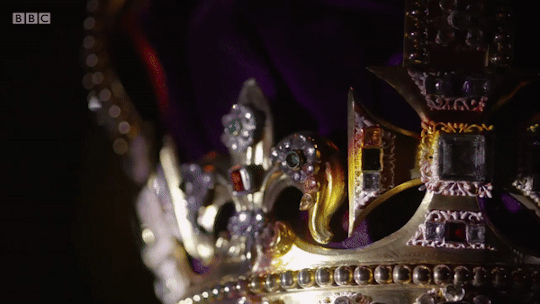
Even though we now know that the coronation on May 6th will not be a tiara event, I'll still keep a running list of foreign royals that have confirmed attendance. Traditionally other monarchs don't attend coronations in the United Kingdom unless they are from a Commonwealth country (Brunei, Eswatini, Lesotho, Malaysia, and Tonga) but they are doing away with that this time around.
Bahrain - King Hamad bin Isa Al Khalifa
Belgium - King Philippe & Queen Mathilde
Bhutan - King Jigme Kesar & Queen Jetsun Pema
Brunei - Sultan Hassanal Bolkiah & Prince 'Abdul Mateen
Cambodia -
Denmark - Crown Prince Frederik & Crown Princess Mary
Eswatini - King Mswati III & Queen Sibonelo LaMbikiza
Japan - Crown Prince Akishino & Crown Princess Kiko
Jordan - King Abdullah II & Queen Rania
Kuwait - Crown Prince Mishal Al Ahmad
Lesotho - King Letsie III & Queen 'Masenate
Liechtenstein - Hereditary Prince Alois & Hereditary Princess Sophie
Luxembourg - Grand Duke Henri & Grand Duchess Maria Teresa
Malaysia - King Abdullah & Queen Azizah
Monaco - Prince Albert & Princess Charlene
Morocco - Princess Lalla Meryem
Netherlands - King Willem Alexander & Queen Máxima
Norway - Crown Prince Haakon & Crown Princess Mette Marit
Oman - Crown Prince Theyazin bin Haitham Al Said
Qatar - Emir Tamim bin Hamad Al Thani
Saudi Arabia - Prince Turki bin Mohammed Al Saud
Spain - King Felipe & Queen Letizia
Sweden - King Carl XVI Gustaf & Crown Princess Victoria
Thailand - King Vajiralongkorn & Queen Suthida
Tonga - King Tupou VI & Queen Nanasipau’u
United Arab Emirates - Sheikh Mansour bin Zayed Al Nahyan
Non-Reigning Royals
Ashanti - King Otumfuo Osei Tutu II & Lady Julia
Baden - Margrave Bernhard & Margravine Stephanie
Bulgaria - King Simeon & Queen Margarita
Greece - Queen Anne Marie & Crown Prince Pavlos (I've seen conflicting reports about Crown Princess Marie Chantal attending.)
Hesse - Landgrave Donatus
Hohenlohe-Langenburg - Prince Philipp & Princess Saskia
Māori - King Tuheitia & Queen Te Atawhai
Romania - Princess Margareta & Prince Radu
Serbia - Crown Prince Alexander & Crown Princess Katherine
157 notes
·
View notes